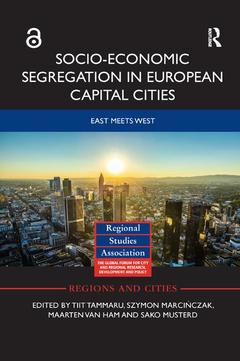Socio-Economic Segregation in European Capital Cities East meets West Regions and Cities Series
Coordonnateurs : Tammaru Tiit, Marcińczak Szymon, van Ham Maarten, Musterd Sako

Growing inequalities in Europe are a major challenge threatening the sustainability of urban communities and the competiveness of European cities. While the levels of socio-economic segregation in European cities are still modest compared to some parts of the world, the poor are increasingly concentrating spatially within capital cities across Europe. An overlooked area of research, this book offers a systematic and representative account of the spatial dimension of rising inequalities in Europe.
This book provides rigorous comparative evidence on socio-economic segregation from 13 European cities. Cities include Amsterdam, Athens, Budapest, London, Milan, Madrid, Oslo, Prague, Riga, Stockholm, Tallinn, Vienna and Vilnius. Comparing 2001 and 2011, this multi-factor approach links segregation to four underlying universal structural factors: social inequalities, global city status, welfare regimes and housing systems.
Chapter 1 of this book is freely available as a downloadable Open Access PDF under a Creative Commons Attribution-Non Commercial-No Derivatives 3.0 license. https://s3-us-west-2.amazonaws.com/tandfbis/rt-files/docs/Chapter1+A+Multi-Factor+Approach.pdf
Chapter 15 of this book is freely available as a downloadable Open Access PDF under a Creative Commons Attribution-Non Commercial-No Derivatives 3.0 license. https://s3-us-west-2.amazonaws.com/tandfbis/rt-files/docs/Chapter15+Inequality+and+Rising+Levels+of+Socio-Economic+Segregation.pdf
1. A multi-factor approach to understanding socio-economic segregation in European capital cities 2. Occupational segregation in London: A multilevel framework for modelling segregation 3. Changing welfare context and income segregation in Amsterdam and its metropolitan area 4. Socio-economic segregation in Vienna: A social-oriented approach to urban planning and housing 5. Widening gaps: Segregation dynamics during two decades of economic and institutional change in Stockholm 6. Economic segregation in Oslo: Polarisation as a contingent outcome 7. Socio-economic segregation in Athens at the beginning of the twenty-first century 8. Socio-economic divisions of space in Milan in the post-Fordist era 9. Economic crisis, social change and segregation processes in 10. Urban restructuring and changing patterns of socio-economic segregation in Budapest 11. The velvet and mild: Socio-spatial differentiation in Prague after transition 12. Occupation and ethnicity: Patterns of residential segregation in Riga two decades after socialism 13. Large social inequalities and low levels of socio-economic segregation in Vilnius 14. The ‘market experiment’: Increasing socio-economic segregation in the inherited bi-ethnic context of Tallinn 15. Inequality and rising levels of socio-economic segregation: Lessons from a pan-European comparative study
Tiit Tammaru is a Professor of Urban and Population Geography and Head of the Centre for Migration and Urban Studies at the University of Tartu, Estonia.
Szymon Marcińczak is Assistant Professor at the Institute of Urban Geography and Tourism, Lódź, Poland.
Maarten van Ham is Professor of Urban Renewal at Delft University of Technology, the Netherlands, and Professor of Geography at the University of St Andrews, UK.
Sako Musterd is Professor of Urban Geography at the University of Amsterdam, the Netherlands.
Date de parution : 12-2019
15.6x23.4 cm
Date de parution : 08-2015
15.6x23.4 cm
Thèmes de Socio-Economic Segregation in European Capital Cities :
Mots-clés :
Te Ch; Socio-economic Segregation; Socioeconomic Segregation; Es Ta; OLS Regression; Segregational Curve; ISCO Category; Clerical Support Workers; Elementary Occupations; Segregation Index; LQ; Location Quotients; Dissimilarity Index; Vice Versa; Related Trades Workers; Sociospatial Differentiation; Higher Occupational Categories; Socio-spatial Differentiation; High Rise Housing Estates; Census Tract Level; Minimum Income Households; Madrid Metropolitan Area; Hungarian Central Statistical Office; Low Socio-economic Status Neighbourhoods; Major Occupational Categories
